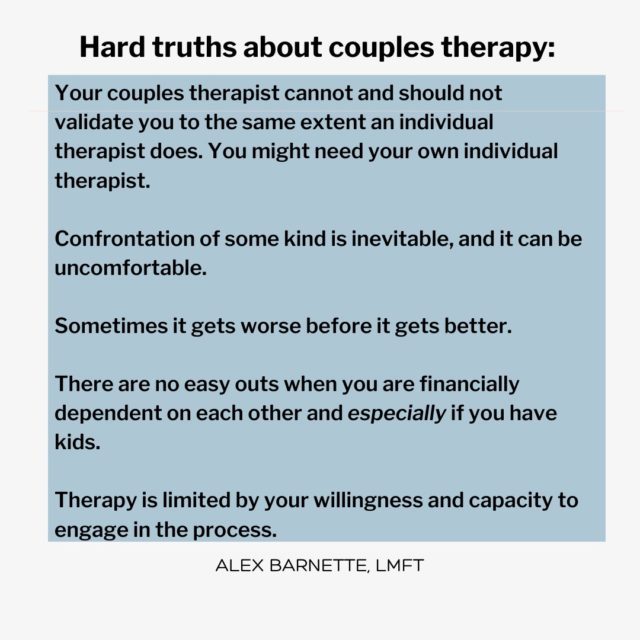What I know about working with individuals is how hesitant people are to start couples therapy and how important it is they feel safe with the couples therapist. What I know about working with couples is how unrealistic it is that both partners are going to feel safe all the time…and how some individuals can spend years in therapy without really working on things.
Note: there is a certain window of tolerance all therapy sessions should stay in, and it’s really important to work with a trauma-informed therapist that understands how to do this.
I’m NOT suggesting you grit and bear it. I’m hoping this will help create more realistic expectations of how couples therapy works.

So here are the hard truths:
You should feel like your couples therapist has your back, but your couples therapist cannot and should not validate you to the same extent an individual therapist does—The goal is for your partner to learn how to do that. If your couples therapist is too validating, the risk is making your partner feel incompetent or aligning too much with one person.
The couples therapist is there to move the relationship forward. If they are spending too much time working with one partner on something that is not relevant to the relationship, the other might feel abandoned in the session. Similarly, if a couples therapist is approaching couples therapy like individual therapy with two individuals, it’s possible your relationship will get worse. Instead of creating mutuality and shared goals, you might become even more polarized. Not helpful.
Confrontation is inevitable, and it can be uncomfortable—This really depends on how comfortable you are with being held accountable and talking about your role in the relationship. In general, I find it necessary to be very direct when working with couples. It gets confusing quickly when I’m not.
Sometimes it gets worse before it gets better— If you and partner have disengaged, you’re likely going to need to work through some hurt and anger before you can feel good with each other again. You should experience at least a little relief in getting feedback and support from your therapist, but there may still be times when you leave feeling negative about your relationship. If you can stick with it, you should get more clarity about what the relationship can offer and what changes are possible. This is why I always encourage couples to give at least 4 sessions before they stop therapy (assuming the therapist is a good fit).
There are no easy outs—in terms of the best-case scenario. It’s hard to downsize to an apartment if you divorce, and it’s heartbreaking to know how a divorce can affect your kids. It’s complicated, and it’s scary. On the other hand, if you want to work on the relationship, we’re going to have to address some hard topics. So if you are at this point, you may need your own therapist and/or additional individual support.
It can be helpful to remember that the work you do to understand yourself in relationships is never wasted–regardless of whether or not you and your partner stay together. As one therapist shared with me, “clients can either work on their issues in this relationship or the next one”. Sometimes it is more helpful to accept where you’re at than to try to escape it. You should, however, experience at least a little relief or gain some hope in each session, and this is again why it’s so important you are working with a therapist you trust.
One caveat: If your current relationship is physically or mentally unsafe, the goal might be to get out and continue working individually after.
Lastly, therapy is limited by your willingness and capacity to engage in the process. Willingness—you won’t get much out of therapy if you are not invested in it. Capacity—therapy moves at the pace of the person with the lowest tolerance in the room.
This can be incredibly frustrating to the partner that’s done “more of their own work”. Sometimes it helps for the partner with a lower threshold to start their own therapy. It does more harm than good to push beyond what someone can handle in a session.
All of this being said, it’s not all bad in couples therapy. There are many moments of tenderness, even with couples on the brink of divorce. Also, the discomfort you experience should still be tolerable and should be in exchange for clarity about the relationship or a better relationship. If you feel like you are suffering through sessions and not getting anywhere, I encourage you to tell your therapist or find a new therapist!
I hope this explanation helps you feel more prepared, please let me know if you have any questions!